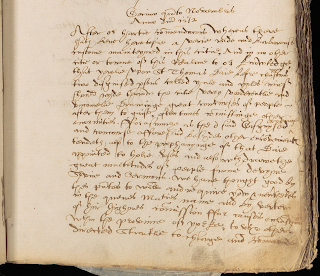In York, the longest night and shortest day heralded the ancient
custom of the Yule Riding and the beginning of Christmas festivities. During
the reign of Elizabeth I, in around 1570, an anonymous balladeer wrote Yule in Yorke, a broadside ballad describing
the Riding. [1]
The custom included a disguised couple carrying a leg or shoulder of lamb and a cake of ‘purest meale’, the playing of music
and the throwing of nuts by the following crowds. The full text of this ballad
and many others like it has been made available through the Bodleian Libraries Ballads Online project, which brings together a rich collection of often unique
printed songs, satires, news and moral advice.
 |
| The ballad of Yule in Yorke, shared under Creative Commons licence. |
This pious representation of the celebration links (sometimes rather tenuously) each part
of the festivities to the birth of Jesus. A rather different view of St Thomas’
Day and ‘the very old, gray bearded Gentleman called Christmas’ is shown in a
satirical passage printed in London in 1645, which describes a Bacchanalian
Father Christmas enjoying, food, drink and gambling amongst other activities!
 |
| Printed by the festively named Simon Minc'd-Pye and Cissely Plum Porridge. Thewhole document can be read at Early English Books Online |
One can imagine that
it was celebrations more like these that prompted the 1572 letter written to
the Mayor and Aldermen of York decrying the city’s ‘verie rude and barbarouse’ Yule
Riding. Recorded in the Act Book of the High Commission, the letter bemoans the
profaning of the holy day and despairs at the crowds of people drawn from
otherwise divine services to watch (and presumably participate in!) the
spectacle.
 |
| HC.AB.7 f42v |
 |
| HC.AB.7 f41r |
Transcribed, the letter reads as follows:
13 November 1572
After our hartie commendacions, whereas there hath bene heretofore a verie rude and barbarouse custome mainteyned in this citie, and in no other citie or towne of this realme to our knowledge,
that yerelie upon St Thomas Daie before Christmas two disguised persons called Yule and Yules Wief should ryde thorow the citie verey undecentlie and uncomelie, drawinge great concurses of people after them to gaise, often times committinge other enormities, forasmuche as the said disguysed rydinge and concourse afforesaid besydes other enconvenientes tendeth also to the prophanynge of that daie appointed to holie uses and also withdrawethe great multitudes of people frome devyne service and sermons, we have thought good by thes presents to will and require yow & nevertheles in the Quenes Majesties name and by vertew of hir highnes commission for causeis ecclesiasticall within the Province of Yorke to us & others directed, straitlie to charge and commaunde yow that ye take order that no such ryding of Yule and Yules Wief be frome hencefurth attempted or used, and that yow cause this our preceipte and order to be registred of recorde and to be duelie observed not onelie for this yere but also for all other yeres ensueng, requiringe you hereof not to fale as our truste is you will not and as ye will answere for the contrarie. Fare you hartelie well atYorke this XIIIth of November 1572
Your lovinge frendes
Edm. Ebor
Thomas Eymis
Will. Stryckland
Chrisofer Asheburne
[To the]
Maior and aldermen
of Yorke
The letter was signed by Edmund Grindal, Archbishop of York (previously
Bishop of London and later Archbishop of Canterbury). Upon his appointment two years earlier, he had already found that “many
superstitious practices remained” amongst the people of York and he recommended
that the boisterous Yule festival be banned ‘for all other yeres ensuing’. When
read to the council, it was agreed that “no disguysed persons called Yule and
Yule’s wif … shall ryde this yere nor any yere hensforth, on Saynt Thomas Day
before Christmas”.
But do not despair! Although the Yule Riding was banned in
1572, to this day the York Waits process from Micklegate Bar around the city on Midwinter night, accompanied by
traditional Tudor instruments and a crowd of followers. Maybe if you're out after dark, you'll be able to hear the sounds of Elizabethan York in the ancient streets once more.
Sources:
R. Davies, Municipal Records of the City of York, 1843.
F. Drake, Eboracum, 1736
A. F. Johnston, Records of Early English Drama, Vol.1, No.1. 1976
Sources:
R. Davies, Municipal Records of the City of York, 1843.
F. Drake, Eboracum, 1736
A. F. Johnston, Records of Early English Drama, Vol.1, No.1. 1976
[1]
Broadside ballads were printed on large sheets of paper and sold from
street-corners, or stuck up in pubs, by travelling ballad singers.
[2]
Then Dean of the Minster and later Archbishop himself.
No comments:
Post a Comment
Note: only a member of this blog may post a comment.